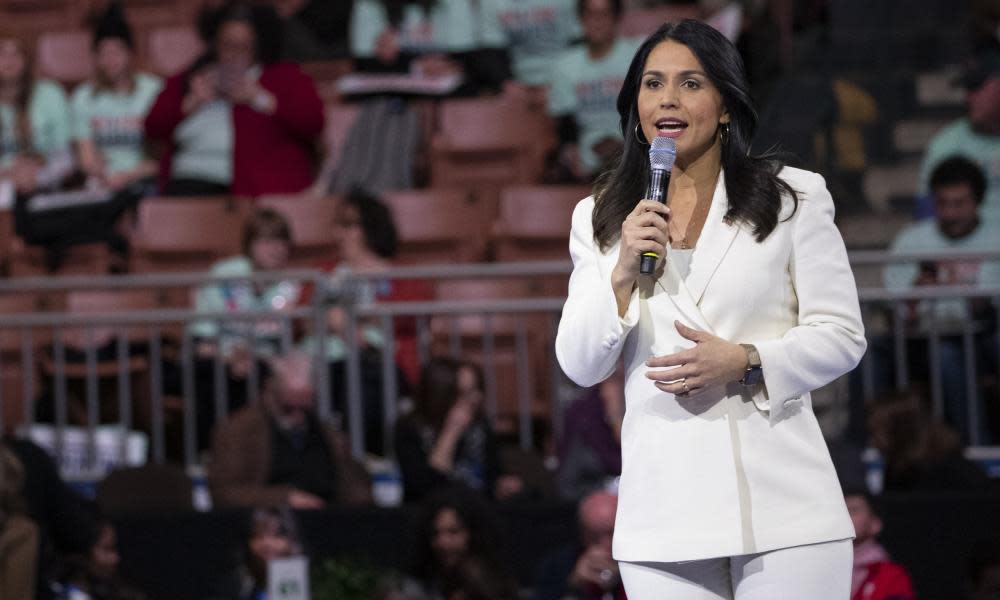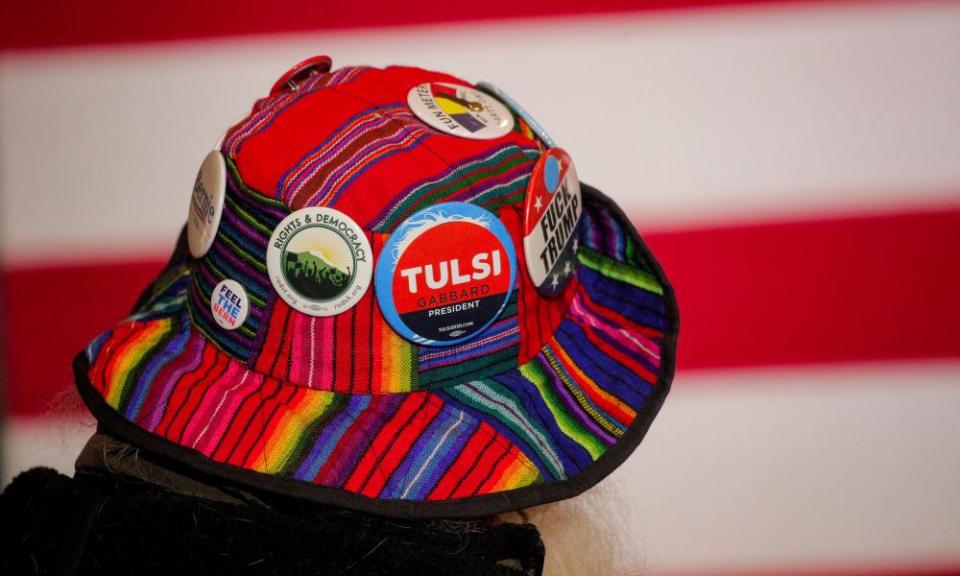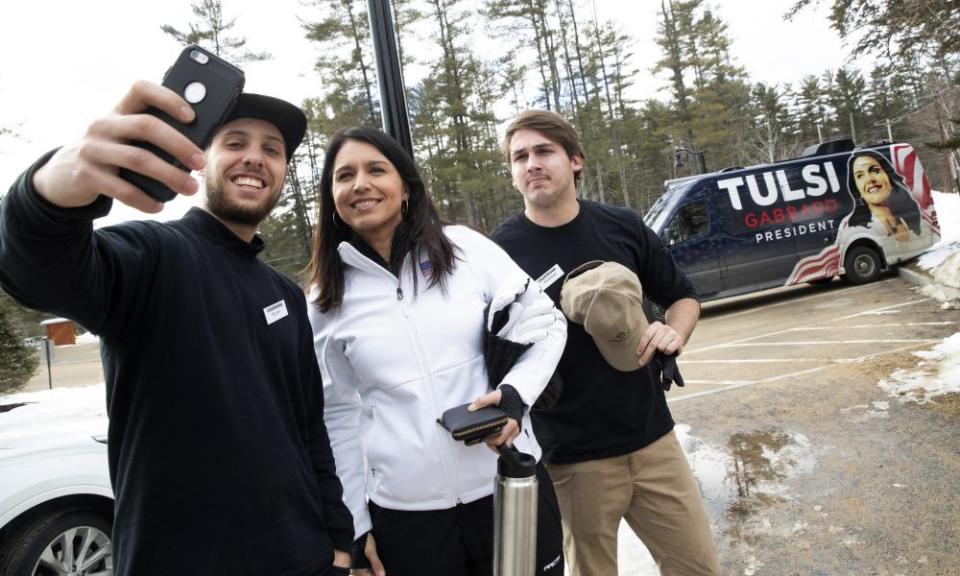Tulsi Gabbard's unique campaign brought people together – but looks to be coming apart

If Tulsi Gabbard drops out of the Democratic race in the coming days, her unique campaign is likely to be remembered more for her spats with the Democratic party, accusations of being a Russian operative, and the imagery of her promise to “bring a soldier’s heart to the White House” than a realistic bid for president.
The Hawaii congresswoman’s unusual political journey, which has seen her go from a rising progressive star to a regular Fox News guest supported by Republicans and libertarians, has so far not endeared her to supporters in New Hampshire, which goes to the polls Tuesday.
While Iowa traditionally holds the first caucuses in the presidential election, New Hampshire has held the first primary since 1920.
The goal for presidential candidates is to win early-voting states and create name recognition and a sense of momentum, as well to pick up their first delegates, who will eventually choose the nominee in summer.
Sometimes a clear favorite for the nomination emerges quickly, but the last two major Democratic primary contests, pitting Barack Obama against Hillary Clinton and then Bernie Sanders against Clinton, have lasted from the Iowa caucuses in January through to late spring.
After more than a year campaigning and holding more than 130 events in the Granite state alone, Gabbard is currently at 3.3% in the polls. She held 70 events in Iowa, an effort that won her the votes of 342 people on caucus night.
“As president I will have your back,” she told a crowd in Rochester this weekend. “I promise I will treat every American with respect.”
In all likelihood, Gabbard will not get the opportunity to prove that. The Democratic contest has not been kind to the long-shot candidates so far. The businessman and former congressman John Delaney, after spending two and a half years and more than $25m campaigning, dropped out days before the Iowa caucus.
Joe Sestak, a three-star admiral and two-term congressman, pulled out at the end of 2019. Bigger names such as Cory Booker, Julian Castro, Kamala Harris and Beto O’Rourke have all fallen to the whims of the Democratic electorate.

Gabbard’s rally in Rochester had gotten off to an inauspicious start, when the Elk’s Lodge venue misspelled her name: a TV screen displaying a “Tulsie” rally alongside listings for “western night” and “meat raffle”.
Gabbard is 38 and has made physical vitality – along with her military service in the Hawaii national guard – a central feature of her campaign. She has posted videos of her surfing, taking part in push-up contests and working out in the gym.
Yet for all that she has run a strangely joyless campaign.
At rallies she speaks slowly, using lingering pauses, more like a university lecturer than a politician inspiring a crowd. In Greenland, it didn’t bother the crowd.
“I met Tulsi on New Year’s Day,” said Spiro Paras, an ardent Gabbard supporter. “With direct personal contact I realized she has a soul and means what she says. That’s visible in her eyes and face.”
The rally came amid a busy weekend for Gabbard. On Saturday she went on Fox News to defend Donald Trump’s decision to fire key impeachment witnesses Lt Col Alexander Vindman and EU ambassador Gordon Sondland.
On Sunday, she went on Fox News again, this time appearing on Sean Hannity’s show. Hannity, a friend and informal adviser to the president who has promoted conspiracy theories about Barack Obama, Hillary Clinton and the dead DNC staffer Seth Rich, praised Gabbard for her courage.
“I think she’s taken politically brave acts that have blacklisted her with the Democratic party leadership,” Paras said.
He was referring not just to Gabbard’s Fox News sojourns. Gabbard bucked her party’s elders to back Bernie Sanders over Clinton in 2016, and in December did not vote to impeach Trump. In January, Gabbard sued Clinton for $50m in retaliation for Clinton suggesting the Hawaiian was a Russian asset, months after Gabbard filed a $50m lawsuit against Google for allegedly suspending her campaign’s advertising.
Despite all evidence to the contrary, Gabbard’s campaign believes she can outperform expectations in New Hampshire. One aide pointed to polls that show her with more than 5% support here – those polls exist, they are just few and far between – and Gabbard’s supporters seem just as optimistic.
“Definitely top three, possibly even the top one,” was Paras’s prediction for Tuesday’s vote.

Gabbard does have some reason to feel aggrieved at her treatment. Along with Clinton’s Russia accusations, Gabbard was left out of a pair of CNN town halls last week, even as the former Massachusetts governor Deval Patrick – polling even lower than Gabbard – was invited. She has regularly complained that her campaign hasn’t received enough coverage from the press.
That was the case at her rallies on Saturday and Sunday, where there were comparatively few journalists. They missed Gabbard, whose central theme is ending wars and diverting military funding to social programs, playing up the political diversity of her supporters, who are often male and skew conservative.
Gabbard asked the Democrats in the crowd to raise their hands, then the Republicans to raise their hands, and then the “libertarians or independents” to put their hands in the air.
Kevin Frost, 38, who was at the Greenland event with his wife and daughters, fitted into the independent camp.
“I feel like some of the field is a little bit far left for where I feel we are as a country,” Frost said.
He voted for Mitt Romney over Barack Obama in 2012, and for John McCain in 2008. In 2016, Frost said he voted “against Clinton, but not for Trump”.
“The idea that [Gabbard] stepped out and held off the impeachment fiasco, that speaks volumes,” Frost said. “To me it seems like if she’s going to do that now, then when she’s president she’ll maybe think of things a a little bit more too.”
If the vote on Tuesday reflects the polling, Gabbard will probably not be president.
To her fans, her attempt to bring people with different political beliefs together might have been a noble effort, but it just isn’t clear how it helps in winning the Democratic nomination.

